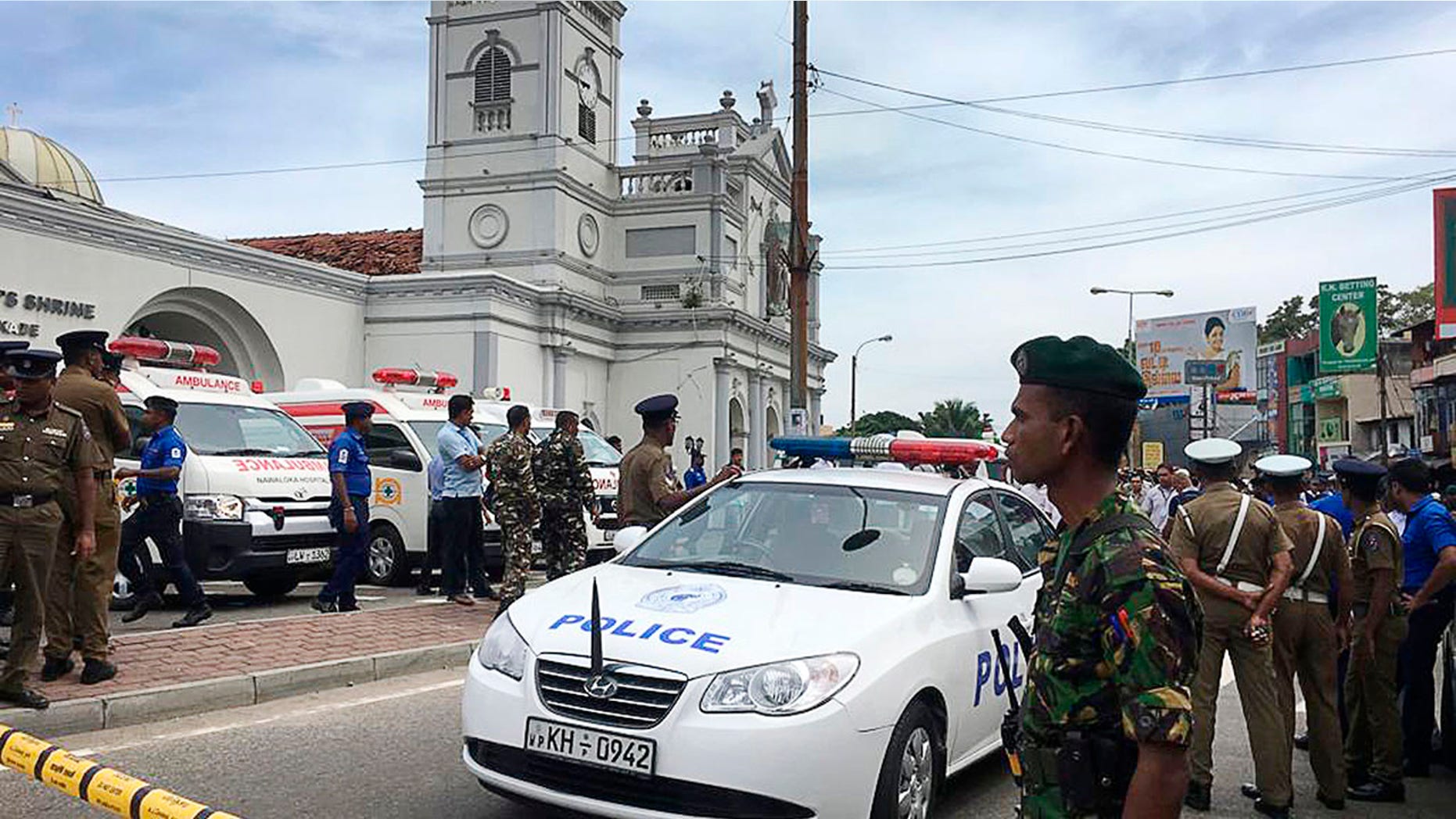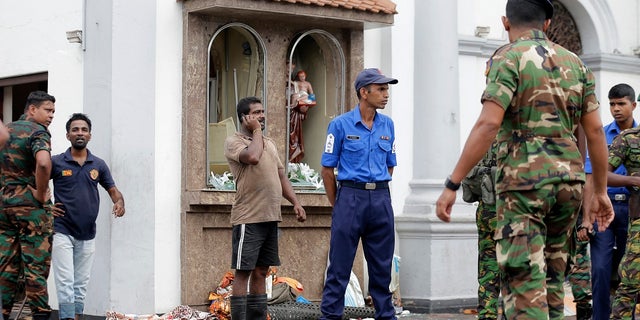As worshipers gathered on Sunday at Roman Catholic churches across Sri Lanka to celebrate Easter Mass, the culmination of Holy Week, a wave of explosions rocked the congregations.
At about 8:45 a.m., at least eight bombing attacks struck at least three churches, along with three five-star hotels favored by foreigners, killing almost 200 people, in what the police said had been a coordinated attack.
• A senior presidential aide said it appeared that the attacks had been carried out by suicide bombers. No group immediately claimed responsibility for the bombings.
• Seven people were detained in connection with the attacks, according to the economics minister.
• Sri Lanka blocked major social media and messaging services, including Facebook and WhatsApp, to curb misinformation, according to the president’s secretary, Udaya Seneviratne.
• A health official at the National Hospital of Sri Lanka said 189 people had been killed. But the death toll was expected to rise. Eleven foreigners were among the dead, she said.

A wave of explosions erupted as worshipers celebrated Mass
Images from the site of the bombings showed bloodied and shattered pews and victims lying on the floor of houses of worship. The walls and windows of the targeted hotels were blown out.
Some of the victims were killed as worshipers gathered for Mass at St. Anthony’s Shrine in Colombo, the capital; St. Sebastian’s Church in Negombo, about 20 miles north of Colombo; and Zion Church in the eastern city of Batticaloa, officials said.
The attacks also targeted high-end hotels in Colombo, the capital, including the Shangri-La, the Cinnamon Grand and the Kingsbury.
Mangala Samaraweera, the Sri Lankan finance minister, called the explosions “a well-coordinated attempt to create murder, mayhem and anarchy.”
A witness, Sarita Marlou, who was at the Shangri-La hotel, wrote in a Facebook post that one blast occurred at 8:57 a.m. in the Table One Restaurant on the third floor where people had gathered for brunch.
“Felt the blast all the way up to the 17th floor where we were sleeping,” she wrote. “Few minutes later, we were asked to evacuate the hotel. While running down the stairs, saw a lot of blood on the floor but we were still clueless as to what really happened.”
Ms. Marlou posted that the guests had been stuck outside for more than two hours before being ushered back inside as the sun got hot. But they still were not cleared to go back to their rooms, she wrote.
Social media is restricted and a curfew imposed
The government shut down access to major social media and messaging services, including Facebook and WhatsApp, and internet transmission slowed drastically.
The authorities took a similar step after sectarian violence last year. At that time, some of the violence has been instigated by Facebook postings that threatened attacks on Muslims, the government said.
The government also set a nationwide curfew from 6 p.m. Sunday to 6 a.m. Monday.
Ruwan Wijewardene, the defense minister, said that seven people had been arrested in connection with the attacks, according to the economics minister, Harsha de Silva, in a post on Twitter.
Wounds of past violence are still fresh in Sri Lanka
Sri Lanka’s civil war ended almost 10 years ago, but memories of urban carnage are still fresh, particularly for residents of the capital. During the conflict, brutal bombings of airports, bus stations, banks, cafes, and hotels were not uncommon.
The Cinnamon Grand, one of the hotels targeted on Sunday, had been blown up before, in 1984, when it was called the Hotel Lanka Oberoi.
The Roman Catholic Church in Sri Lanka traces its roots to the arrival of the Portuguese in the early 1500s and the subsequent influence of Portuguese, Dutch and Irish missionaries. Sri Lankan Catholics make up a significant minority of the country’s population, accounting for roughly 6 percent of the country and centered largely in the Colombo-Negombo area.
In 1995, Pope John Paul II traveled to Sri Lanka to canonize Joseph Vaz, an Indian-born priest and missionary. Thousands of people greeted the pope’s motorcade as it traveled from the airport in Negombo to Colombo.
Meenakshi Ganguly, the South Asia director at Human Rights Watch, said that given Sri Lanka’s long history of ethnic and religious violence, including a nearly three-decade civil war that only ended in 2009, it was premature to jump to conclusions about whether radicalized Muslims might have played a role in the attacks.
But the scale of the attacks and the death toll on Sunday were unprecedented even by Sri Lanka’s bloody standards, Ms. Ganguly said.
“In three decades of war, this scale of attack has never happened,” she said. “In terms of serious, religion-based violence, we haven’t really seen that.”
World leaders condemned the attack
Pope Francis, after celebrating Easter Mass in St. Peter’s Square at the Vatican, said the bombings in Sri Lanka had “brought mourning and sorrow.”
He expressed “affectionate closeness to the Christian community, struck while it was gathered in prayer, and to all the victims of such cruel violence.”
In a Twitter post, Prime Minister Ranil Wickremesinghe of Sri Lanka denounced the assaults and urged the public not to spread misinformation, which has fueled the country’s sectarian divide in the past.
India’s prime minister, Narendra Modi, called the blasts “horrific” in a post on Twitter. “There is no place for such barbarism in our region,” he wrote. India is Sri Lanka’s closest neighbor and shares many cultural and economic ties with the island nation.
Prime Minister Imran Khan of Pakistan said his country “stands in complete solidarity with Sri Lanka in their hour of grief.”
Prime Minister Theresa May of Britain, President Emmanuel Macron of France and Chancellor Angela Merkel of Germany were among the European leaders to express their grief.
Jean-Claude Juncker, president of the European Union Commission, said that he had received news of the bombings “with horror and sadness.”
President Recep Tayyip Erdogan of Turkey said in a post on Twitter that the attack was “an assault on all of humanity.”
President Trump said on Twitter that the United States stood ready to help, though the tweet inflated the number of victims in a typo.
“Heartfelt condolences from the people of the United States to the people of Sri Lanka on the horrible terrorist attacks on churches and hotels,” he wrote, adding that the explosions had “killed at least 138 million people and badly injured 600 more.”
‘Hotels are on guard in Sri Lanka’
Brahma Chellaney, a professor of strategic studies at the Center for Policy Research in New Delhi, said that it was unexpected that the attackers had the confidence to raid hotels in Sri Lanka, saying that the island’s hotels had tried to provide tight security during the island’s civil war and ever since.
“Hotels are on guard in Sri Lanka, so I’m surprised that three hotels still came under target,” he said.
Buddhist statues were defaced last year in Sri Lanka in what appears to have been an iconoclastic attack by Muslims, he said. In the Maldives, radical Muslims destroyed Buddhist archaeological finds in early 2012 at the country’s National Museum.
https://www.nytimes.com/2019/04/21/world/asia/sri-lanka-explosion.html
2019-04-21 11:32:39Z
52780273201173



